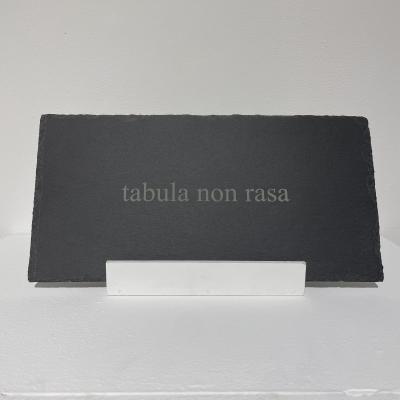“Text Me When You Get Home” explores the complexity of “home” through art of the written word

Text Me When You Get Home is a collection of work by seven artists with connections to Ohio, Palestine, and the written word. The exhibition features an array of mediums, from poetry to photography, videography, sculpture, and archival print. Each with their own personal interpretation and incorporation of calligraphy and text, the artists in this exhibition convey the personal and political realities of the Palestinian diaspora.
Upon entering the gallery, the viewer is presented with a labyrinth of podiums, standing together like flowers in a garden, each displaying a poem. One of the featured writers, Sara Abou Rashed, presents her poems reflecting on the idea of “home” and her identity in America. One of her powerful featured writings, “Eventually, Someone Must Ask If I Love This Country, Pt.1,” illustrates the duplexity of her responses to moving and growing up in America. She starts the poem by stating “This country, where I live a stranger,” immediately to inform the viewer of the disconnect she feels in this country, which she purposefully does not call “home” but rather a place where she “gained a passport at 5 years old, not as a nationality, but as a prize.” The beginning of the poem is woven with American idiosyncrasies, such as eating turkey to convey thankfulness and using the imperial unit of measurement. What I liked about this poem is that as the viewer reads on, the notion of belonging is more than the application of certain tendencies, but instead should be defined as the feeling of being accepted and welcomed. Rashed delivers a powerful ending to the poem and answers her chosen title in the final verse:
“But, eventually, someone must ask if
I love this country and there’s an assumption
and a confederate flag and a possibility
and an accent change and political correctness
and a middle finger and an alien status box
someone like me shakes her head no—
that is precisely the purpose of the question.”

As I sit at the Hopkins Hall Gallery front desk, taking in the artwork I am surrounded by, I am confronted by one piece directly looking back at me. Propped up on a white shelf, in front of the white wall, the slab is almost floating—a dark gray, rectangular piece of slate, with the phrase “tabula non rasa” engraved in the center. “Tabula rasa” is defined by Merriam-Webster as “the mind in its hypothetical primary blank or empty state before receiving outside impressions.” What I found most compelling is that translated from Latin, the phrase means “scraped tablet”—i.e., “clean slate.” Not only is this piece of slate literally not clean by the addition of the engraving, but it conveys to the viewer that there is no clean slate untarnished by immediate outside impressions. By examining this piece, and thinking about the phrase, I interpret that it is about the formation of preconceived notions based on surface-level qualities and outside influences. The purpose of the “non” in the phrase is to illustrate, therefore, that the slab does not have a “clean slate”—not due to the engraving, but perhaps due to preconceived notions from outside impressions. I love a good play on words.
Text Me When You Get Home exhibited at Hopkins Hall Gallery from June 7–23, 2023. The exhibition was presented by Gazala Projects under the curation of Mona Gazala, and featured Sara Abou Rashed, Hala Abubaker, Noor Hindi, Noel Maghathe, Amena Sheikh, and Mandy Shunnarah.
